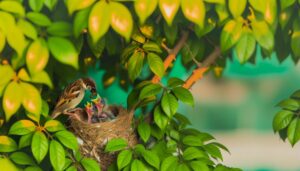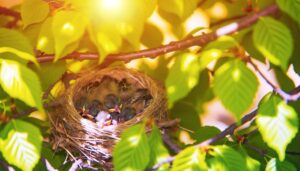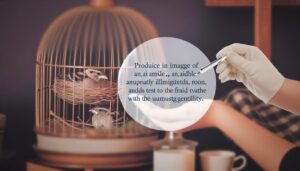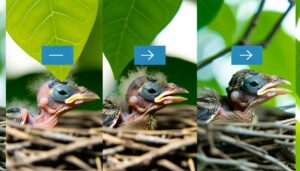How Do Sparrows Regurgitate to Feed Their Babies?
Yes, sparrows regurgitate food to feed their babies. As a parent, a sparrow will partially digest seeds and insects in its crop, making it easier for the nestlings to absorb vital nutrients.
This regurgitation provides a diet rich in protein and essential fats, necessary for the rapid growth and development of the young. You'll see parents meticulously selecting and regurgitating nutrient-rich food directly into the gaping mouths of their nestlings.
This behavior underscores their dedication to ensuring their offspring's survival. For a close look at their fascinating feeding strategies, consider exploring sparrow nesting habits further.
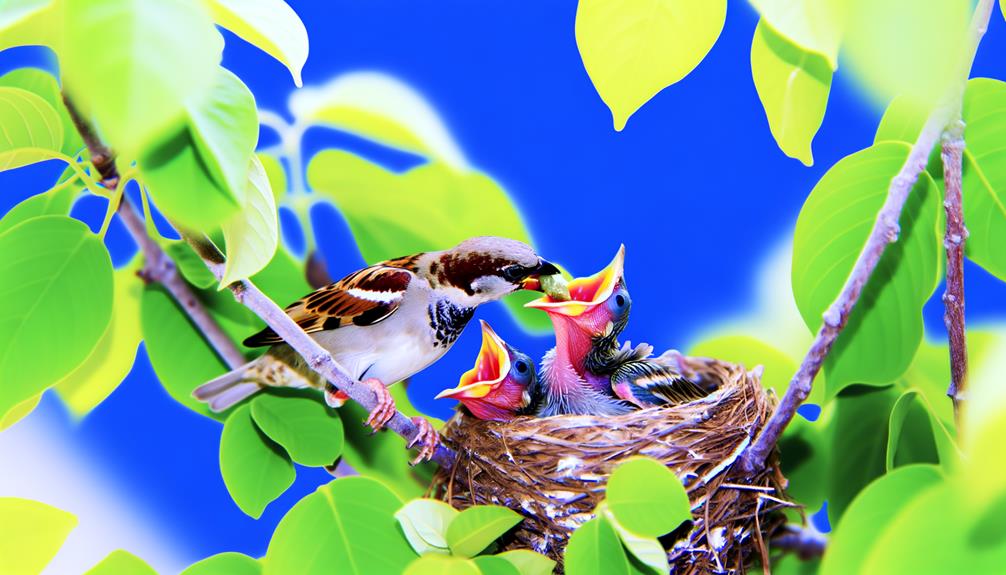
Key Takeaways
- Sparrows regurgitate partially digested food to feed their nestlings.
- Regurgitation ensures that nestlings receive nutrient-rich food for growth.
- The process aids in the absorption of essential nutrients by the young birds.
- Regurgitated food includes seeds, insects, and small invertebrates.
- This behavior is crucial for the rapid development and survival of nestlings.
Feeding Habits of Sparrows

When observing the feeding habits of sparrows, you'll notice that these passerines primarily consume seeds, insects, and small invertebrates. Their diet is diverse, reflecting their adaptability to various environments.
Sparrows, belonging to the family Passeridae, exhibit foraging behaviors that include ground pecking and foliage gleaning. You'll often see them hopping or flying short distances to access food sources. They use their conical bills, adept at cracking seeds, which provides a vital advantage for survival.
During the breeding season, sparrows increase their intake of protein-rich insects to meet their elevated energy requirements. As you watch these industrious birds, you'll appreciate their role in controlling insect populations and their contribution to the ecosystem's balance through seed dispersal.
Nutritional Needs of Nestlings
Observing sparrows' feeding habits provides insight into the specific nutritional needs of their nestlings, which rely on regurgitated food from their parents for optimal growth and development.
As a caretaker, you'll notice that Passer domesticus nestlings require a diet rich in protein and essential fats. This diet primarily consists of partially digested insects and seeds. Protein is vital for muscle development and overall growth, while fats provide the necessary energy for rapid metabolic processes.
The parents' regurgitation process guarantees that the food is pre-digested, making it easier for the nestlings to absorb these nutrients. By understanding these needs, you can better appreciate the intricate care sparrows provide, ensuring their young thrive in the early, vulnerable stages of life.
Regurgitation in Birds

Have you ever wondered why many bird species, including sparrows, engage in the complex process of regurgitation to feed their young? This behavior is important for nestling survival.
Adult birds consume food, partially digest it, and then regurgitate it into the mouths of their chicks. This method guarantees that the young receive a nutrient-rich, easily digestible meal, meeting their high energy and growth demands.
Regurgitation involves the crop, a specialized pouch in the esophagus. The crop allows food storage and controlled release. By regurgitating, parents can provide pre-digested food that's easier for nestlings to absorb.
This feeding strategy is essential for species like Passer domesticus, ensuring rapid development and increasing the survival rate of the young.
Observations in Sparrow Nests
In sparrow nests, one can frequently observe adult Passer domesticus meticulously regurgitating food into the gaping mouths of their nestlings.
You'll notice the adults selecting specific food items, often insects and seeds, which they partially digest. This regurgitated mix is nutrient-rich, crucial for the rapid growth of their altricial young.
The nestlings exhibit a feeding response known as gaping, where they open their mouths wide, signaling their hunger. Adults respond promptly, ensuring each chick receives adequate nourishment.
This behavior underscores the parents' dedication to their offspring's survival. By observing these interactions, you gain insight into the intricate care strategies of sparrows, highlighting the importance of parental investment in avian species' development and survival.
Alternative Feeding Methods
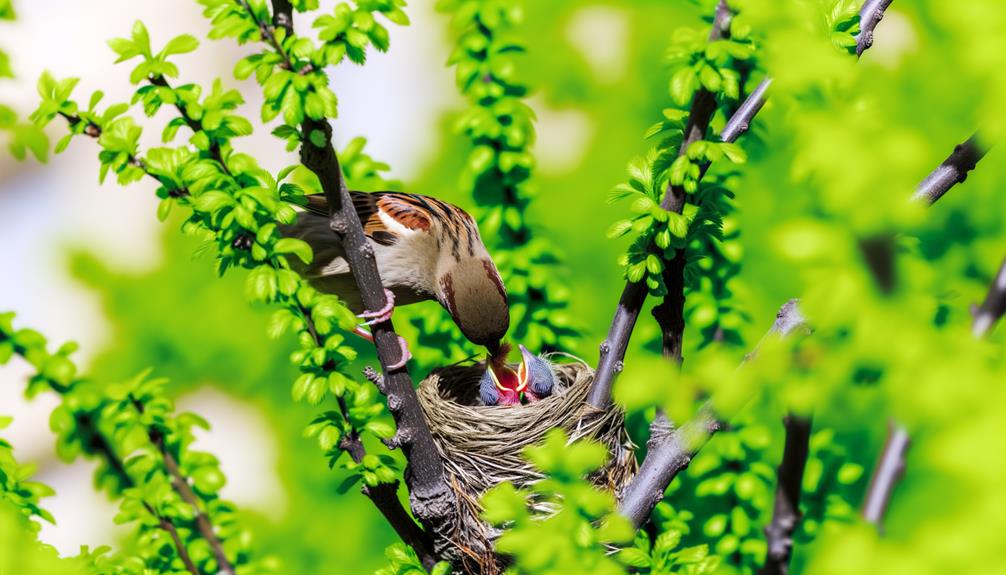
While regurgitation remains the primary feeding method, sparrows also employ alternative strategies like direct insect transfer and foraging assistance to guarantee their young receive adequate nutrition.
You'll notice that adult sparrows often catch insects and bring them directly to the nestlings, bypassing the regurgitation process. This method safeguards the chicks receive fresh, unprocessed food, rich in proteins and essential nutrients.
Additionally, juvenile sparrows sometimes follow their parents to foraging sites, learning essential survival skills. Observing these behaviors highlights Passer domesticus' adaptability and the multifaceted nature of their caregiving.
Conclusion
Imagine yourself as a diligent gardener, nurturing each plant with care.
Like you, sparrows tend their nestlings meticulously. Through regurgitation, akin to gardeners providing nutrient-rich compost, these avian parents guarantee their young thrive.
Yet, just as different plants require varied care, sparrows sometimes employ alternative feeding methods. Observing these intricate behaviors reminds us of nature's adaptability and precision, echoing the intricate balance within ecosystems.
It's a reflection of life's complexity, where every action nurtures future growth.


